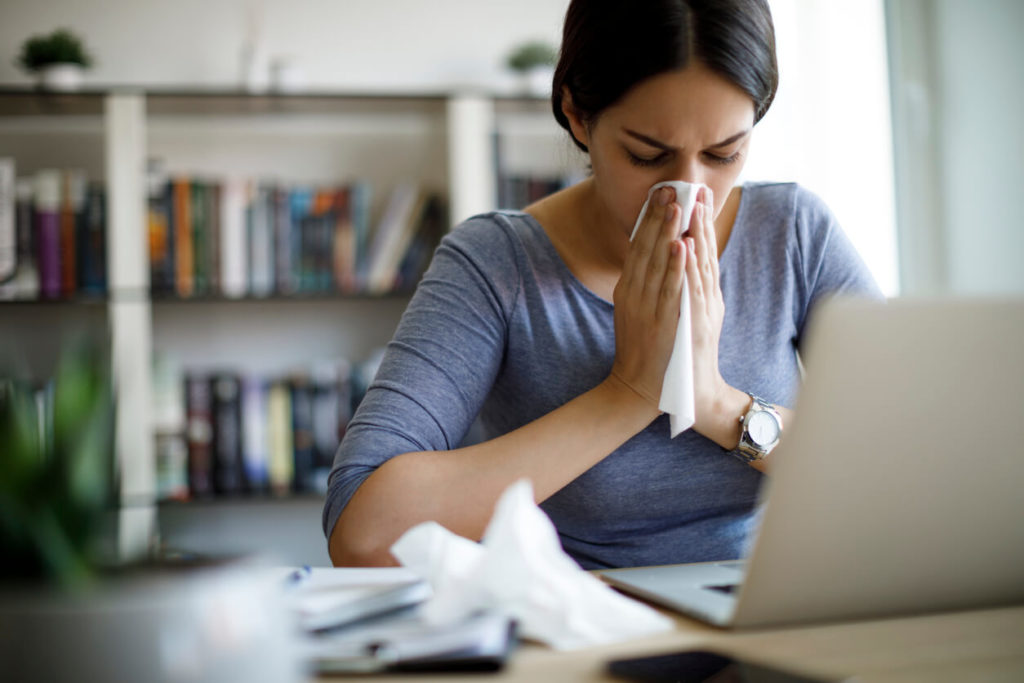Spring is here, which means the weather is warming up, and the sun is sticking around longer each day.
Sunny days and April showers bring blooming flowers — which are easy on the eyes, but tough on the respiratory system. And since the common cold continues to lurk year-round, even during allergy season, it makes it hard to tell the two apart.
Runny nose, headache, low energy, pressure on your face — these symptoms are shared by both the common cold and allergies.
Either one can feel debilitating, and can interfere with work or even your personal life. You may feel foggy as you try to accomplish tasks for the day, or feel too tired to leave the house and socialize on the weekends.
Understanding the difference between allergies and cold symptoms will help you figure out the right treatment plan you need. We’ve created a checklist below to help you understand whether you’ve got a cold or allergies, how to treat it, and when or if to see a doctor.
Do I Have Allergies or a Cold?
Before we can answer this question, let’s define both. It’s all too easy to mistake allergies for a cold, and vice versa.
What is the Common Cold?
The common cold is an infection of your nose and throat caused by a virus. Generally a cold is harmless — though it often doesn’t feel that way!
Many different types of viruses can cause a common cold when they infect you.
These viruses are transferred to you in the same way as the flu. When someone else has the cold, the virus transfers through the air and enters your body through your mouth, eyes, or nose.
This means if we have a cold, we are contagious after our symptoms begin.
What are Allergies ?
Allergies happen when your immune system reacts to a foreign substance — such as pollen. Essentially, your immune system produces antibodies that identify a particular allergen as harmful to your body — even though it really isn’t.
That’s why when you come in contact with the specific allergen, your immune system’s reaction can inflame your skin, or create sinus issues, or even impact your airways or digestive system.
Unlike a cold, allergies aren’t contagious.
Colds Vs. Allergies
While colds and allergies can often have similar symptoms, both are very different in their root cause.
Read the checklist below to better understand the signs you have allergies or signs you have a cold.
Cold Symptoms: The Checklist
✓ A sore throat may have been the first symptom
✓ Clear & watery runny nose
✓ Low energy and fatigue
✓ Potentially running a low-grade fever- Though this may be a sign of the flu
✓ Mild aches and pains
✓ A dry and persistent cough
✓ Your symptoms came on gradually
✓ Symptoms typically last for about a week
Allergy Symptoms: The Checklist
✓ Your symptoms began and intensified within 24 hours
✓ Sneezing and an itchy, runny, or blocked nose
✓ Scratchy, red, watering eyes
✓ Wheezing, chest tightness, shortness of breath, and a cough
✓ A raised, itchy, red rash on your face, arms, or legs
✓ Swollen or itchy eyes
✓ Dry, red, and cracked skin around your nose
✓ Your symptoms last for several weeks
How to Treat Allergies
Just like a cold, there are ways to lessen the impact of allergies. Even better news, seasonal allergies generally go away on their own when we you are no longer exposed to the triggers, like pollen or animal dander.
Reduce your exposure to your allergy triggers.
- Your immune system will continue to create antibodies based on the time and duration you are continually exposed to your allergy, like pollen.
- If you need to spend prolonged time outdoors, consider investing in a pollen mask.
During the months when the pollen count is high, take extra precautions.
- Watch your local news to see what the pollen count will be before making plans to be outdoors.
Keep your indoor spaces clean and pollen-free.
- Keep windows & doors shut when the pollen count will be high, and remove clothes you have worn outside to be washed.
Try over-the-counter remedies.
- Nasal spray, decongestants, and oral antihistamines to treat excessive or constant sneezing or even itchy eyes.
How to Treat a Cold
Sadly, there’s no cure for the common cold. But you can treat your symptoms and rest your body to find relief until it passes.
One of the most painful parts of experiencing a cold is the sore throat that usually presents itself as the first symptom. Sore throat remedies are an at-home treatment plan that can help to relieve some discomfort.
- Boil water and add honey with fresh lemon. This is an excellent and tasty remedy for a sore throat. Honey helps to break up congestion, and the hot water helps to soothe any pain.
- Stay hydrated. Water and juice are great options. Avoid alcohol and caffeine if you are suffering from a cold, as these work to dehydrate you.
- For adults and children age 5 and older, over-the-counter decongestants, antihistamines, and pain relievers might offer some symptom relief.
- Rest is crucial. Your body is fighting a virus, and needs extra sleep to recover.
Should You See a Doctor for a Cold or Allergies?
Whether you are experiencing a cold or allergies, if symptoms persist for more than a few weeks, it’s time to see a doctor.
When your symptoms become chronic, a doctor or allergist will be able to dive in deeper to understand any potential underlying conditions, and future solutions for you based on your needs.
The good news is, you can get treatment virtually with myCallADoc. With our affordable and easy-to-use telemedicine services, there’s no need for a doctor’s appointment to interfere with your work or personal life.
MyCallADoc doctors can treat and diagnose your issues through your smartphone, tablet, or laptop. Our board-certified telemedicine doctors are available to help you 24/7, 365 days a year.
And if you need a prescription, our doctors can send these straight to your pharmacy. Members can even save up to 80% on prescriptions!
Skip the waiting room and check out the future of medicine and wellness with a virtual doctor appointment — on your own time.
Boost Your Immune System with the Right Foods
Since we know the common cold is caused by a virus, it can help us learn tools that can prevent us from getting sick in the first place. Of course, you can get sick despite your best efforts.
But to try and avoid the sniffles caused by a cold or even the flu (ick!), you can boost your immune system with a healthy, nutrient-dense diet.
Your diet can significantly influence your body’s reaction to viral infections. Check out our list of 8 super foods to help boost your immune system this spring >
This article is not intended as medical advice. Always check with your doctor before embarking on a new health and wellness plan.



